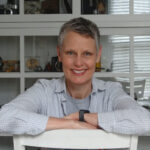By Kathryn White
There’s a new type of program popping up at universities across the country. It’s geared toward a segment of learners not unlike higher education’s longer-held target demographic, recent high school graduates.

Students in this new wave of programs are adults in what Avivah Wittenberg-Cox, a writer, entrepreneur, and consultant for gender and generational balance, calls the Third Quarter (age 50-75) of life.
Like their 18- to 25-year-old counterparts, they are entering a stage of exploration, preparing for the next chapter of life. Wittenberg-Cox unpacked the trend in her Sept. 28 Forbes magazine article, “Old School: Midlife Transition Programs Take Off.”
The programs are fueled by declining enrollment numbers at U.S. colleges and universities coupled with greater market awareness around the interests and needs of a growing 50-and-older population.
“If 60 is the new 40, people will need places and people to help them prepare for midlife re-inventions, accelerations or adaptations. Universities could have a key role to play, if they are willing to flex their model, and recreate themselves,” Wittenberg-Cox said.
The trend traces back to 2009 when Harvard University launched its Advanced Leadership Initiative. Similar offerings can now be found at Stanford University, Loyola University Chicago, the University of Notre Dame, and others. And starting this January, in Denver.
“CU Denver’s a logical place to offer a program like this,” said Anne Button, program director for CU Denver’s new Change Makers program. “In the heart of the city, with all of our connections. “Universities are traditionally built to help people figure out their purpose at the start of their careers. Why not at the end of their primary career? This is what we do. Why not extend who we do it for?
“There’s this huge untapped resource of skills, experience, and wisdom in people at this stage of life,” Button continued. “And there are a lot of unmet needs in the community. Change Makers offers that opportunity to translate what you’ve already done into what you can contribute in your next stage of life.”
Change Makers will run for four months, an academic semester, and will be offered twice a year, in the fall and spring. The spring 2023 inaugural program begins Jan. 10 and ends April 26. The fee is $3,200. Need-based scholarships may be available.
Its website states, “Through expertly guided cohort discussions, seminars with practitioners, opportunities to audit CU Denver classes, and an optional applied “internship” in a nonprofit or social enterprise, Change Maker fellows investigate areas of interest and growth and develop an actionable plan for using their wisdom in a new, fulfilling context.”
Button herself is in that Third Quarter of life, with two children off on their own and a 15-year career in university executive communications under her belt. She participated in CU Denver’s most recent strategic planning process, while at the same time following the success of programs like Harvard’s.
It started to coalesce for her: CU Denver’s “next step,” as well as her own. She’s moved from communications into program leadership. Button is now actively recruiting for the first cohort of Change Maker fellows.
“People who run these programs are positively evangelistic about them. I’ve spoken with several. And they say that, universally, for participants, their cohort in the program becomes the single most beneficial component. It’s the discussion with people in the same stage of life, asking the same sorts of questions.”
Mendelle Elit, whose primary career has been accounting, is asking those questions. “How do I go on to that next step?”
Elit said, “What will it look like?” Elit is looking forward to becoming an inaugural Change Maker fellow in January.
“I’m hoping to make connections. And gain the skills,” said Elit. “I’m an accountant. But I know a lot of the needs more globally are going to be around food insecurity, housing insecurity, business development. I want to make that leap from what I’ve done up to this point, supporting businesses and supporting my family financially for many years. I’m transitioning to supporting other people and my community.”
Visit ucdenver.edu/change-makers to apply or to learn more.
Kathryn has lived in North Denver since around the time the Mount Carmel High School building was razed and its lot at 3600 Zuni became Anna Marie Sandoval Elementary. She’s raised two children in the neighborhood, worked at several nonprofits, and volunteered with the Alzheimer’s Association Colorado Chapter.
Do you have story ideas for The Gray Zone? Email thegrayzone.denvernorthstar@gmail.com.

Be the first to comment